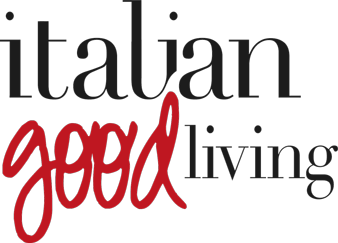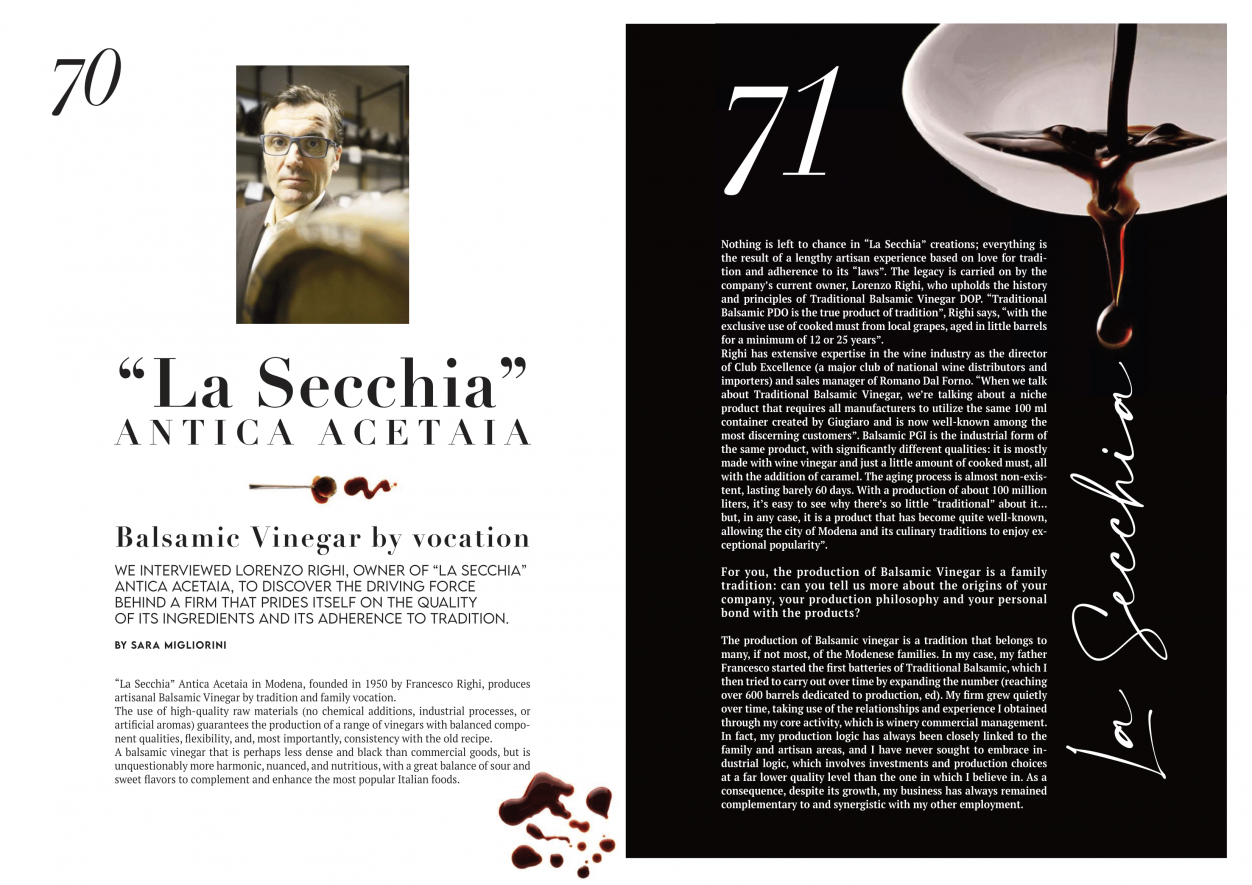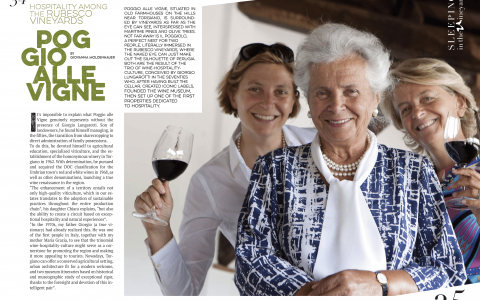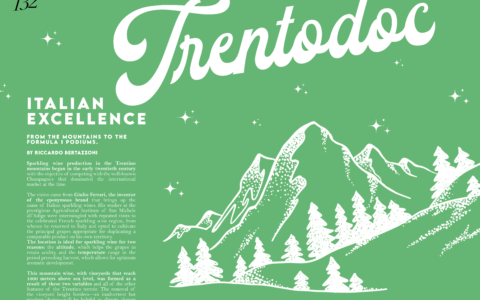“La Secchia” Antica Acetaia: Balsamic Vinegar by vocation
We interviewed Lorenzo Righi, owner of “La Secchia” Antica Acetaia, to discover the driving force behind a firm that prides itself on the quality of its ingredients and its adherence to tradition.
By Sara Migliorini
“La Secchia” Antica Acetaia in Modena, founded in 1950 by Francesco Righi, produces artisanal Balsamic Vinegar by tradition and family vocation.
The use of high-quality raw materials (no chemical additions, industrial processes, or artificial aromas) guarantees the production of a range of vinegars with balanced component qualities, flexibility, and, most importantly, consistency with the old recipe.
A balsamic vinegar that is perhaps less dense and black than commercial goods, but is unquestionably more harmonic, nuanced, and nutritious, with a great balance of sour and sweet flavors to complement and enhance the most popular Italian foods.
Nothing is left to chance in “La Secchia” creations; everything is the result of a lengthy artisan experience based on love for tradition and adherence to its “laws”. The legacy is carried on by the company’s current owner, Lorenzo Righi, who upholds the history and principles of Traditional Balsamic Vinegar DOP. “Traditional Balsamic PDO is the true product of tradition”, Righi says, “with the exclusive use of cooked must from local grapes, aged in little barrels for a minimum of 12 or 25 years”.
Righi has extensive expertise in the wine industry as the director of Club Excellence (a major club of national wine distributors and importers) and sales manager of Romano Dal Forno. “When we talk about Traditional Balsamic Vinegar, we’re talking about a niche product that requires all manufacturers to utilize the same 100 ml container created by Giugiaro and is now well-known among the most discerning customers”. Balsamic PGI is the industrial form of the same product, with significantly different qualities: it is mostly made with wine vinegar and just a little amount of cooked must, all with the addition of caramel. The aging process is almost non-existent, lasting barely 60 days. With a production of about 100 million liters, it’s easy to see why there’s so little “traditional” about it… but, in any case, it is a product that has become quite well-known, allowing the city of Modena and its culinary traditions to enjoy exceptional popularity”.
For you, the production of Balsamic Vinegar is a family tradition: can you tell us more about the origins of your company, your production philosophy and your personal bond with the products?
The production of Balsamic vinegar is a tradition that belongs to many, if not most, of the Modenese families. In my case, my father Francesco started the first batteries of Traditional Balsamic, which I then tried to carry out over time by expanding the number (reaching over 600 barrels dedicated to production, ed). My firm grew quietly over time, taking use of the relationships and experience I obtained through my core activity, which is winery commercial management. In fact, my production logic has always been closely linked to the family and artisan areas, and I have never sought to embrace industrial logic, which involves investments and production choices at a far lower quality level than the one in which I believe in. As a consequence, despite its growth, my business has always remained complementary to and synergistic with my other employment.
For some years now, supermarket shelves have gradually been filled with various types of “balsamic vinegars”. What happened?
In recent years, the industrial product has grown in popularity. Brands have multiplied: there are several varieties of items available, each with its own price and image. Instead of a real strategy based on actual quality, industrial logic employs preconceptions rooted in peasant culture, as well as more or less shady combinations. The truth is that the advertised vinegar could never be used for the combinations suggested in the advertisement, and that true traditional balsamic vinegar has nothing to do with peasant tradition. In fact, only noble or affluent individuals could afford to produce a pricey product like Traditional Balsamic.
In your opinion, how can a consumer protect himself from the confusion caused by this abundance of products?
Let’s admit it: the consumer is in a tough situation. Above all because there are no features that distinguish the products from a quality standpoint. In actuality, the manufacturing standards give relatively limited leeway in terms of product description and creation. Typically, the buyer makes a first decision based on the price range he considers appropriate and the image of the bottle, until he discovers a product that meets his expectations. However, adding value to a product in this way is extremely difficult. In reality, the same type of PGI Balsamic is almost always provided with numerous packaging options, ostensibly to evaluate which containers are more appealing to clients, implying that looks are valued more than content.
Has your firm taken more stringent and long-term decisions on production regulations?
Certainly. In terms of the Traditional PDO, we definitely adhere to stringent manufacturing requirements, which provide all of the assurances of a product of the greatest quality.Our Modena PGI Balsamic Vinegar stands out due to the complete lack of chemical ingredients, industrial processes, and caramel. We guarantee a minimum quantity of 60% cooked must as a raw material (while the industry expects at least 20%). Furthermore, the greatest barrel utilized for PGI balsamic vinegar maturing is 225 liters, whereas industries employ wooden or steel barrels of hundreds of hectoliters.In terms of aging, the industry standard is 60 days, whereas we require a minimum of one and a half years for the cheapest product.
What are the primary sales channels for your Modena PDO Traditional Balsamic Vinegar, and how did they evolve during the pandemic?
Unfortunately, the horeca channel had significant challenges, which were widely recognized prior to the pandemic, and were connected to extremely sluggish payments, resulting in a highly negative financial cash flow. The situation has improved marginally; we’ve also started to establish ourselves on a number of internet marketplaces in order to get a stronger position, particularly in international markets, aiming at the ultimate client.
To summarize, Modena Balsamic Vinegar is a key product in the gourmet landscape of Emilia-Romagna and, more extensively, the whole Bel Paese; what are some of the most inventive applications of Modena Balsamic Vinegar you’ve seen?
It is a product with a high degree of combinability. Properly dosed, it can be used on many dishes, from meat to fish to first courses to cheeses. Lately it is also used for cocktails. My favorite combination, though, is a basic omelette with onion, bacon, and balsamic vinegar; it’s a terrific classic, and it never fails to please!





